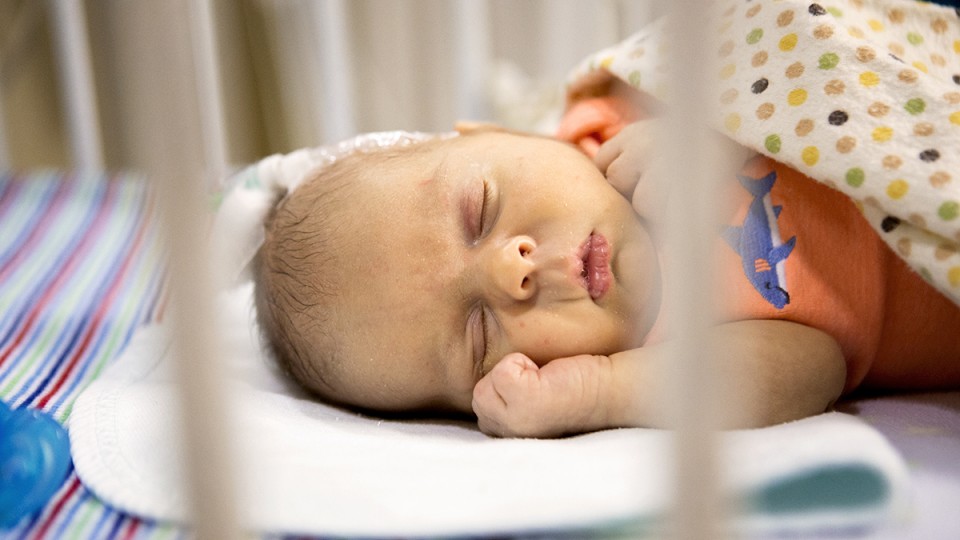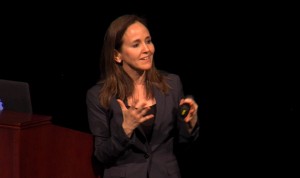Building readiness among infants now
- April 6, 2016
- / Reggie Dogan
- / education

Credit: Sacred Heart Hospital.
The most important growth and development that physically forms the brain starts well before a child ever picks up a pencil, reads a book or goes to school.
Part of that development is related to brain development. The relationships with the important people in a baby’s life can literally shape and form the intricate structure of an infant’s brain.
Dr. Dana Suskind, a pediatric surgeon and renowned expert on early learning, believes the power of language is the heartbeat of a child’s brain development.
“How many words a child hears and how they are spoken were critical factors, not just in vocabulary development, but in IQ and test scores in the third grade,” said Suskind, who brought her expertise on early learning to Pensacola last week at Washington High School. “How many words a child heard and how they were spoken were critical factors for school readiness and academic trajectories, catapulting some to the top and sending some to languish at the bottom.”

Dr. Dana Suskind on stage at Washington High School, where she spoke about the importance of parents' role in brain development.
Suskind, the author of “Thirty Million Words: Building a Child’s Brain,” is a professor of surgery at the University of Chicago and the director of the Pediatric Cochlear Implant Program, which gives deaf children the opportunity to hear. She founded the Thirty Million Words Initiative to help parents build the language skills of their children, which Suskind says is the most powerful force in a child’s early years.
In recent years attention has increasingly focused on the most critical period of a child’s life — from 0 to 3 years old. It is considered a critical window of life that sets in motion a person’s intellectual development and lifelong health.
Among the goals of the Studer Community Institute is to improve the community’s quality of life, and providing quality education is an integral part of it.
Kindergarten readiness is among 16 key metrics in the Institute’s Pensacola Metro Dashboard.
Reams of research show that when the brain’s structure has a strong foundation in the early years, infants and toddlers are more likely to be robust learners throughout their lives.
Gavin Rumbaugh and Courtney Miller work at Jupiter’s Scripps Research Institute. Married with a baby, the couple works together on research into memory and how the brain develops and ages.
“No one knows precisely how much positive feedback the brain needs, but I can tell you for certain that a very small amount of it, even if only for a few hours a day, is critically important,” said Rumbaugh, an associate professor in the department of neuroscience at the Scripps Research Institute. “The brain is incredibly resilient, and any positive experience that child has will stay with that child.
Rumbaugh and Miller said they do everything they can to foster the healthy development of their child.
Learning how to cope with adversity and stress is an important part of healthy development in children.
While normal life stressors are not dangerous, and can even be healthy for a developing brain, toxic stress occurs when the body’s response system to stress is activated much of the time.
While a small amount of stress in the body can promote growth, toxic stress can have damaging effects on a child’s learning, behavior and health.
When infants and toddlers are regularly ignored, frequently experience violence, or spend much of their time in highly stressful environments, they are considered to be exposed to toxic stress.
Without caring adults to buffer them, the stress caused by extreme poverty, neglect, abuse or severe maternal depression can weaken the structure of the developing brain, with long-term consequences for learning, behavior and both physical and mental health, Miller said.
The loving, nurturing relationship that parents, family members, and teachers provide can act as a buffer to the effects of toxic stress. Consistent adult support can help a young child come through such difficulties with a brain that is still fully able to learn.
“We try to create an environment for him where he is as comfortable and as happy as possible,” Rumbaugh said.
Miller added: “Yes, that’s true. Stress is not good for the baby brain. It’s not good for any of our brains, but definitely not when you’re a baby.”
Skills and risks that develop during this critical period add up and lay the solid foundation for a child’s future.
For newborns and young infants, most of their emotional experiences take place in the moments of interaction with their parents and caregivers, said Alain Glen, a supervisor for Nurse-Family Partnership Alliance in Miami-Dade.
Newborn and caregiver interactions usually occur around simple but important activities such as comforting, feeding and holding.
“It’s deceptively simple, but the interactions with responsive caregivers build the brain, creating or strengthening it one connection at a time,” he said. “By the time children are 2 years old, the structure of their brain that will influence later learning are mostly formed.”
Building Readiness Among Infants Now, dubbed the BRAIN Program, is an initiative to help parents help their children. It is a universal home-visiting program offered to families of all newborns in Martin and Lucie counties.
The program offers newborn home visits from a hospital nurse, a two-month home visit from a network of helpers who provide information, gifts and monitoring in partnership with area hospitals.
Included in the program for parents is a BRAIN bag, a canvas bag printed with logos of fund providers from each county, and filled with topic-related materials and developmental gifts for the baby.
All parents want their children to have a strong start in life, but some don’t have the knowledge or skills to provide a solid foundation for a successful future in school.
The Zero to Three National Center for Infants, Toddlers and Families offers some helpful tips for parents and caregivers to consider:
— Establish routines with your baby or child
— Allow for and make plenty of time for play
— Help your child learn to become a problem-solver
— Give your child responsibilities
— Celebrate your child’s successes
— Encourage your child to try to master the tasks he or she is struggling with
— Provide language for your child’s experience
— Be a role model yourself
Miller stressed that when it comes to the brain’s development, nothing is permanent and positive change can redirect a child’s brain patterns and life.
“While we are born with the same number of neurons, it can be changed,” Miller said. “While babies can be changed by early life stress, they also can be changed through efforts later on in life.”
People who have the knowledge and skills to provide responsive interactions can help to shape the physical structure of a child’s brain so that he or she will be fully able to learn now, in school and in the years to come.
Ideally, parents, families, teachers, home visitors, policy makers, and anyone who works with or for infants and toddlers and have a solid understanding of how young brains develop and grow can make informed choices in their work.
For experts like Rumbaugh, Miller and Suskind, they all agree that the parents are a child’s first teacher and the interaction between them is crucial to brain and child development
“The importance of parents in the first three yeas of life impacts children’s language, social/emotional development, literacy, math and spatial reasoning and grit,” Suskind said. ‘In the end, it really comes down to talk.”

 CivicCon launches with a look at good growth in cities
CivicCon launches with a look at good growth in cities
 Building stronger brains one baby, one parent at a time
Building stronger brains one baby, one parent at a time
 SCI debuts commercial on Early Learning City
SCI debuts commercial on Early Learning City
 Entrecon: World class speakers and an opportunity to sharpen skills
Entrecon: World class speakers and an opportunity to sharpen skills
 PYP Quality of Life survey 2017
PYP Quality of Life survey 2017
 EntreCon Pensacola 2016: A look back
EntreCon Pensacola 2016: A look back
 Leadership tip: getting better employee takeaways
Leadership tip: getting better employee takeaways
 Leadership tip: be interested instead of interesting
Leadership tip: be interested instead of interesting
 Leadership tip: delivering difficult messages
Leadership tip: delivering difficult messages
 Brain Bags boost Arc, Early Childhood Court programs
Brain Bags boost Arc, Early Childhood Court programs